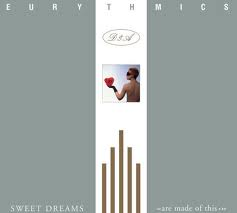 It was the album that made Dave Stewart and Annie Lennox household names and gave life to the blurring of female sexuality in its songs and many accompanying videos. Sweet Dreams (Are Made of This) saw the pair, in the form of their band Eurythmics, break away from their past music lives completely and take on established bands who had carved out success as part of the electronic revolution that had taken place. Driven by Dave Stewart’s excellent grip on the flourishing medium and Annie Lennox’s distinctive vocals, the pair made their commercial breakthrough with Sweet Dreams… and it was well worth it.
It was the album that made Dave Stewart and Annie Lennox household names and gave life to the blurring of female sexuality in its songs and many accompanying videos. Sweet Dreams (Are Made of This) saw the pair, in the form of their band Eurythmics, break away from their past music lives completely and take on established bands who had carved out success as part of the electronic revolution that had taken place. Driven by Dave Stewart’s excellent grip on the flourishing medium and Annie Lennox’s distinctive vocals, the pair made their commercial breakthrough with Sweet Dreams… and it was well worth it.
The lyrics may be short but they were certainly punchy and memorable. On songs such as Jennifer for example the section only had 19 separate and individual words within and this gives the listener the thought and focus of reading an obscure but powerful poem by the likes of Ezra Pound. The economy of the words utilising the strength upon which Ms. Lennox and Dave Stewart were possibly looking for.
The album opens with the song Love is a Stranger and immediately the listener is plunged into territory that could be seen as unnerving and bordering on the fixated and infatuated follower. The opening lines suggest an uneasy/unhealthy obsession with someone and with Annie Lennox’s powerful Scottish voice adds to the mystery and the peril of the song. As openers to an album go it’s a powerful statement of intent. In the hands of almost any other band at the time it could have been a risk to lay such emotions down on record as a step to far, however the pair would stray over the line of what was considered avant-garde many times and it only increased their likeability and uniqueness. If this song was released today it would perhaps raise less eyebrows but at the time it was cutting edge for a woman to be singing of love as destruction, brutal, drug like and false without being seen as feminist statement. It is however one of the best songs that band ever created because of its themes.
Away from the album’s opener, the lyrics become shorter and the electronic interludes become more fascinating and intricate. I Could Give You (A Mirror) hints once more at feminine desire and the unresponsiveness of some prospective partners as Ms. Lennox sings of a burning fire, a passion within her and her willingness to give in to them but finding it strangely frustrating that the would be companion is cold and aloof. The song hints at not wanting to show the disappointment aching within her as she suggests to the listener that she could give a mirror but never actually doing so. This shows the two way street that a reflective surface can bring, not only would she show the cold-hearted nature of the one spurning her warmth but she would also be holding her own image and needs up to closer scrutiny.
The use of concise and limited lyrics is a constant theme throughout the album, whether on The Walk, the excellent Jennifer or on the album’s title track Sweet Dreams…the message seems to be to take in more the hypnotic music rather than hearing verse after verse of the vocalists words. Sweet Dreams… again seems to target the idea of the woman who is in command within a relationship but in this one, unlike the fixated Love is a Stranger, it has more of the disturbed instructions of a mother figure warning their child about the dangers of the world. Rather than it being given in such a way that would calm or ease the anxieties of the person who is about to travel the world and change the way it perceives people from other nations to be, they are left to hear an almost disquieting version in which the warning is that “some of them want to use you…” Even though the purveyor of this information sounds as though she is well travelled, her attitude and knowledge of what she has seen can be summed up in man’s inhumanity to man and the limits of what passes for relationships. Like Love is a Stranger, Sweet Dreams…is also one of the pair’s most imaginative and most loved songs and a testament to the album as a whole.
Thirty years after the album was first released it still holds an idiosyncratic and clever feel to it and although the album cannot be considered the pair’s finest work within the structure of Eurythmics, the follow up 1984 (For the Love of Big Brother) and Revenge being the two main contenders for that title, it nonetheless showed that the pair were more than worthy of being lauded and considered as one of the great music acts of the 1980s.
Ian D. Hall
